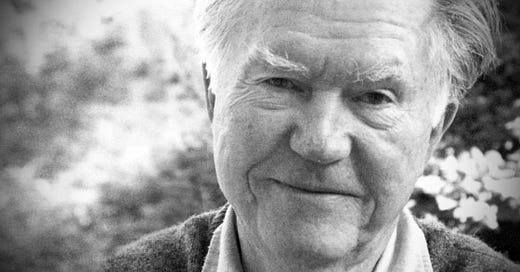Some days when you look out, the land is heavy, following its hills, dim where a road bends. There are days when having the world is a mistake. But then you think, “Well, anyway, it wasn’t my idea,” and it’s OK again. Suppose that a person who knows you happens to see you going by, and it’s one of those days— for a minute you have to carry the load for them, you’ve got to lift the whole heavy world, even without knowing it, being a hero, stumbling along. Some days it’s like that. And maybe today. And maybe all of the time.
I first came across this poem in the collection The Darkness Around Us is Deep, a selection compiled by Robert Bly and published around Stafford’s death in 1993. Stafford’s work has a wit that sometimes feels like sagacious advice from a pragmatic friend. In “So Long” Stafford writes “at least at night, a street light is better than a star.” When the romantic in me is dormant, it’s hard to argue with this sort of logic.
This particular poem feels appropriate. The ever-pragmatic speaker is searching for bright spots in a moment of deflation. The first two lines contain well-balanced l and d sounds that rhythmically lead us to the third, symmetrical line. Say just that third line alone. “where the road bends. There are days when” 8 syllables split down the middle by a mirrored rhyme on both sides, arranged in anapests and tailless trochees given away by the article a being the second word of the line. When you read this line, your brain wants to read “where a road bends, there are days when” but because of the natural de-stress of a, or the way that the n in bends softens the d, or the way that road is just a hardcore word that refuses to be de-stressed, you end up with “where a road bends, there are days when.” This flow makes the following line all the more impactful and its implication hangs on our thoughts for a moment — “having the world is a mistake.”
The ending of the first stanza reflects the illusory relief that comes from non-culpability. It allows an apathetic calm to settle into our speaker, which is highlighted structurally. The final line attempts to slide back into the rhythm set before the realization of the general shittiness of the world — “and it’s OK again.”
Our speaker flips on us a bit at the start of the second stanza. It begins with a shift to a faster pace, using rolling o sounds and drum-like p sounds. “Suppose that a person who knows you happens to see you going by, and it’s one of those days.” You throw the right beat behind that right there and you can weave it into some hip-hop. It flows so well. The speaker keeps the sounds going by in the endings of the next 3 lines. Load. Whole. Knowing it. The sonics of the poem are so good that you have to go back and slow down to appreciate the content. The world sucks but we don’t have to. The world, in this instance, represents the sum of human action. Society might be prone to destruction but individually we are inclined towards the heroism of improving each other’s day, if even for a moment. This heroism isn’t intentional — it’s clumsy. It stumbles along. Ever the pragmatist, the poem ends with reason instead of passion. But is that so bad? If passion brings us heaviness, can’t reason bring us out of it? Maybe today.






Perfect poem for today, and as usual your analysis is so good